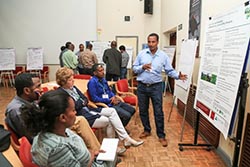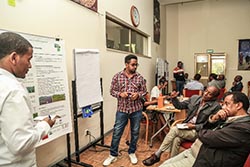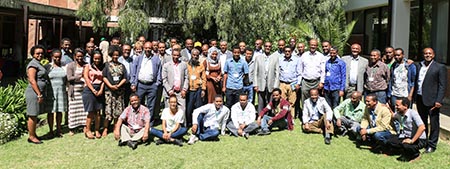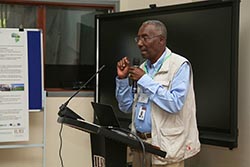N2Africa-Ethiopia has successfully conducted its Fourth Annual Partners’ Review and Planning Workshop during 16-17 March 2017 at ILRI Addis Ababa Campus. The Workshop has provided a National Learning and Experience sharing Platform for N2Africa Ethiopia partners from the four N2Africa target regions; Amhara, Benishangul Gumuz, Oromia and SNNPR. The workshop was conducted under the theme “Moving forward the legume technology and value chain for sustainable development”.
|
Fourth N2Africa Partners’ Review and Planning Workshop Participants |
Participants for the workshop comprised members of the seven N2Africa initiated Public-Private Partnership Clusters. Multi-actors from the public, private, NGOs and framers’ organizations were represented on the workshop. While most participants were from existing partner organizations already mapped into the PPP clusters, new participants from BrazAfric, CropLife Ethiopia and MoA’s AGP were included with potential partnership for labor saving tools, legume crop protection services and technology scale up, respectively. |
|
Dr Azage Tegegn, Principal Scientist and Deputy to ILRI’s Director General’s Representative in Ethiopia, made a warm welcome and opening speech to the Workshop participants. In his speech, he made remarks on the role of Public-Private Partnerships for agricultural sector development and N2Africa’s initiative in this regard. |
Dr Azage Tegegn, while addressing opening and welcome speech to the workshop participants |
An introduction to workshop aims, expected outcomes and overview of major project achievements during 2016 was made by N2Africa Ethiopia Country Coordinator, Dr Endalkachew Woldemeskel. In his presentation, he made emphasis on the relative benefits of N2Africa technologies and the multi-stakeholder partnerships in disseminating, knowledge transfer, and input-output market integrations. N2Africa’s experience on multi-stakeholder partnerships using the Public-Private-Partnerships (PPPs) model, to institutionalize and sustain N2Africa legume technologies, knowledge and expertise was added by Tamiru Amanu, Business Development Officer to N2Africa Ethiopia.
With introductory presentations on overall project progresses and overview to the PPP clusters, first round poster presentations were made by cluster leaders following a “Bus Stop” approach. This was made for all the Seven PPP clusters highlighting major achievements, lessons, challenges and opportunities during 2016 cropping season. Participants with different “hats of value chain actors” made round visits to the “Bus Stops”. Highlights of key achievements reported include improved legume technology dissemination, training framers’ and other subject matter specialists, improved legume seed multiplication, support for inoculant supply chain development and farmers access to grain market. It was clear from these poster sessions that multi-stakeholder collaborations through PPP approaches in addressing multiple legume value chain issues has been made possible. However, the need for further synergy among partners for increased impact has been suggested. Challenges include legume disease/pest infestations, poor legume mechanization services and lack of proper input legume market information prediction mechanisms. Increasing grain legume market price has been reported as an opportunity to venture into legume enterprises.
 |
 |
“Bus Stop” poster presentations from Jimma by Beza Erko (left) and Pawe by Getachew Yilma and Fitsum Miruts (right) PPP clusters |
Second round poster presentation session was dedicated for lead firms and legume input suppliers to share their grain sourcing and input business strategies following similar “Bus Stop” approach as the first poster session. Guts Agro Industry and Agricultural Commodities Supply Ethiopia (ACOS) shared their grain market sourcing strategies. Farmers’ Cooperative Unions and individual traders were reported as the major legume grain suppliers. Menagesha Biotech Industry (MBI) for inoculants and Tsehay Farmers’ Cooperative union for chickpea seed also shared their experience and lessons in legume input business. While the agro-dealer and cooperative models are the major inoculant market outlets for MBI, it is the cooperative model for Tsehay union.
Further to the poster sessions, highlights of N2Africa legume agronomic results with an outlook of 2017 planning has been provided by Birhan Abdulkadir, Field Liaison Officer and Data Manager for N2Africa Ethiopia. This was followed by group breakouts into the seven PPP clusters so as to make quick evaluations of the respective PPPs on the dissemination and business models being followed and make suggestions in the course of future implementations. Group feedback was provided in plenary.
With growing demand for legume labor saving tools, N2Africa is also partnering with BrazAfric for multi-crop threshers and planters, and Knapsack sprayers. Ato Telaye from Brazmart, a sister company to BrazAfric, has made a presentation on potential tools with their possible business models which has nurtured high demand from partners.
A final presentation on key results from N2Africa rhizobiology research, notably, the strain by variety trials across locations by Abere Mnalku from Ethiopian Institute of Agricultural Research. Key results indicated the possibility to identify new rhizobial strains superior to existing commercial elites. In addition, performances of the candidate strains are location and variety specific indicating the possibility for inoculant production targeting specific varieties and locations. The result laid further discussion ground in strengthening common platform for rhizobiology research, registration and sharing for production.
Finally, cluster level planning for 2017 has been facilitated by N2Africa national team. Major focus was given to activities which can ensure sustainability post N2Africa project including strengthening the legume input systems, documentation and sharing of lessons, and liaising with current government agricultural growth initiatives for improved legume technology scale up.
For more information see the N2Africa-Ethiopia-wikispace.
Tamiru Amanu, Dr Endalkachew Woldemeskel and Birhan Abdulkadir, IITA Ethiopia


